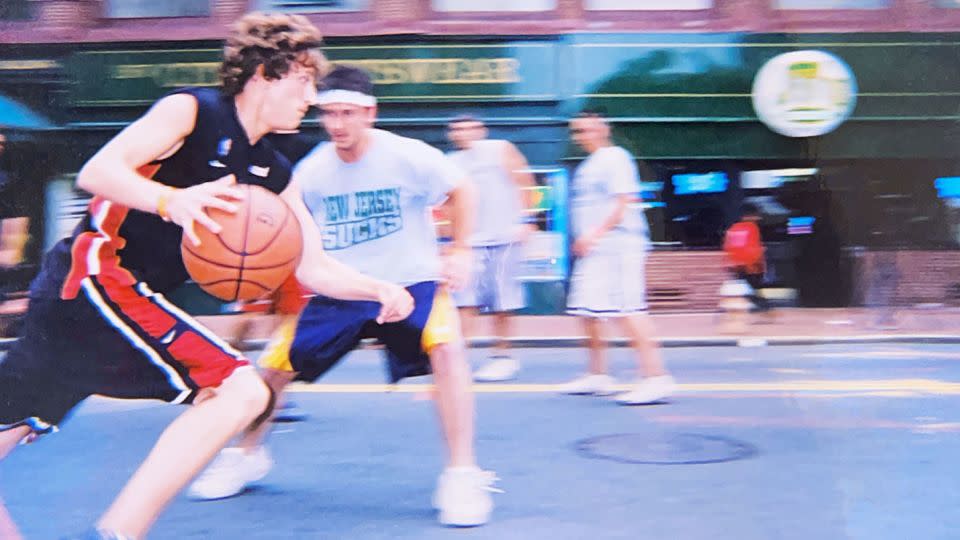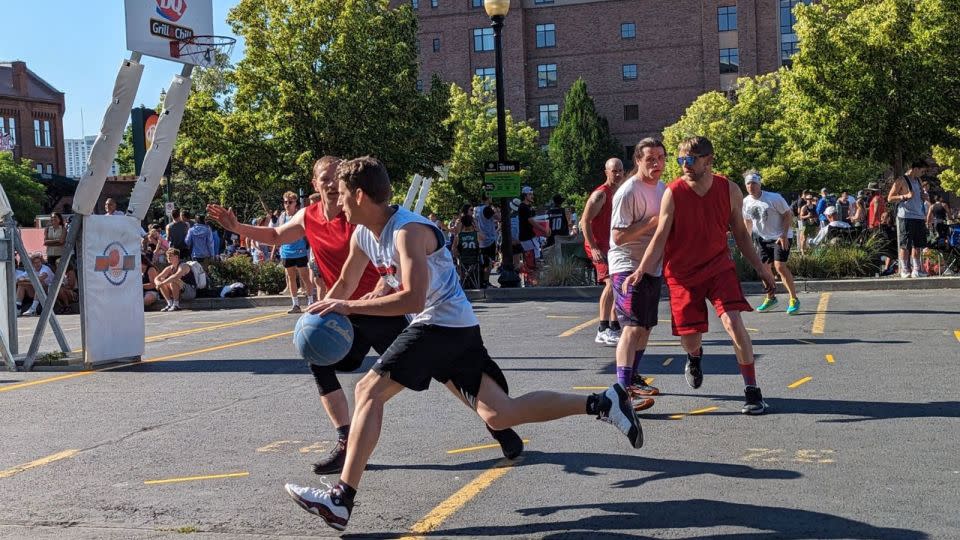These are dark times in a divided nation. Pickup basketball is a ray of hope
Editor’s note: This is a part of a series, May I Recommend, in which writers extol the virtues of a thing or an activity. Past editions have sung the praises of bird feeders and watching old movies.
About 20 years ago, I was a young man with a new job in an unfamiliar city. Some nights, turning off the lights in my one-bedroom apartment, I felt the crushing weight of loneliness. I even said the phrase out loud a few times. The crushing weight of loneliness. No one was there to tell me I was being weird.
In my temporary home of Jacksonville, Florida, I drove along the riverside and past the moss-draped oaks, looking for a game of pickup basketball the way someone might look for an old friend.
The details would be familiar and comforting. The faint musical note of the ball on the concrete. The thud of the backboard and the snap of the net. I’d moved a few times before, and I’d found the same thing in every new place. It doesn’t matter where you are in America. Somewhere nearby is a gym or an outdoor court, and usually someone wants to play.
Near a bend in the St. Johns River, I found a gym with several full courts and a lively pickup game. I took a few warmup shots and called next.
Something fascinating happens in your first game of basketball on a new court. Let’s call it an acceleration. You start running with nine total strangers and get to know them very quickly. Human nature reveals itself through action. There is selfishness (when a guy shoots too much), laziness (when a guy won’t get back on defense), and occasional dishonesty (when a guy repeatedly calls out the wrong score in his own team’s favor).
In rare cases, you even see brutality. One time a guy punched me behind the ear when I disrespected his friend, and the game continued as I lay stunned on the floor near the foul line.

But when it’s good, and it usually is, there is something wonderful and irreplaceable about pickup basketball. Maybe you get smoked on a crossover and your teammate saves you by blocking the layup. Maybe you set a pick for him and then roll to the hoop, and he floats a gentle pass over the defender into your waiting arms. Maybe you get a rebound and see your teammate breaking free down the court, and you whip it ahead for the game-winning bucket.
There is poetry and music in this game, and once in a while you feel a particular kind of love. This doesn’t necessarily mean you’ll be friends for life. After a really good play, you can feel this way about a teammate when you don’t even know his name.
On the court, it doesn’t matter what race or class or age you are
I kept going back to that gym near the riverbend. Sometimes I was the only white guy in there. It was no big deal. If someone called me “Ginobili,” after another reckless lefty two-guard who happened to be white, I took it as a compliment — especially since I’d tried and failed to make two different college teams.
Racial dynamics can be complicated, of course, but in pickup they can also be simple. You hit an open jumper and you’ll probably get the ball again. Miss it, and you’d better go crash the boards and earn some trust. More often than not, pickup ball is a meritocracy.
This one young woman was there pretty often. Her name was Ruthie. She had a smooth crossover and a quality step-back. Ruthie didn’t just like playing with the guys. She liked embarrassing them. “You’re garbage,” she would tell her victims. I quickly learned it was smarter to play with Ruthie than against her.
A new routine developed. I’d finish work and drive across the river to the gym and play for a couple of hours and get home so hungry that I could eat most of a box of pasta and a jar of red sauce with a sleeve of Jimmy Dean Italian sausage mixed in. Sometimes I played four or five times a week.
Eventually I recruited some of my coworkers from the newspaper to play there with me. We joined a rec league. I designed our T-shirts. In a nod to a big hit from Jacksonville’s biggest rock band, we were the Freebirds. I think we won a game or two, but one time we lost so badly that I still remember the score. It was 98 to 25.
One night in that gym, I met a guy known as Corey From Up North Who Fouls.
Corey did not endorse this nickname. I’m not even sure he knew about it; I only heard it from my buddy at the front desk who used it when Corey wasn’t there. But in my experience, it was accurate enough. Corey did foul, often and hard, and this one game he fouled me quite a lot. My temper was rising. It felt like the night could take a bad turn.
Among hundreds or thousands of pickup games over the last three decades, the game with Corey stands out in my memory. I’ll tell you the ending in a minute. But first I want to talk about right now.
I can’t hang on the rim like I used to, and my first step isn’t so quick. I’m 43, married to a woman with great post moves who once helped me and my friend Eric beat a few teams in a 3-on-3 tournament. We have four kids. I have an old back injury that sometimes keeps me on the sidelines. But I still play pickup ball whenever I can, and recently I’ve been thinking about what it means for America in 2024.
In a time when too many people are isolated, pickup ball gets you out of the house and rewards you for talking with strangers.
In a time when men need more friends, pickup ball encourages you to make eye contact. That’s how the point guard knows you’re about to make a backdoor cut.
In a time when everything is too expensive, a pickup game at the playground is free. All you need is a pair of sneakers. Even those are negotiable. At the outdoor court the other day, a big tall guy joined our game. He was wearing Crocs, and somehow he didn’t break his ankles.
In a time when we’re divided by race and class and age, pickup ball cuts across those lines. You might share the court with a 50-year-old college professor, or a 30-year-old air-conditioning repairman, or a 19-year-old high-school dropout. Last year I played against a gray-haired man who hit a game-winner for the other team. I asked how old he was. He said he was 74.

In a time when the facts are so disputed that people seem to be living in parallel universes, pickup ball forces us to inhabit one shared reality. A basket is worth one point. Outside the arc, it’s two. Call your own fouls, and respect what others call. Winners stay. To get back on, you call next or shoot for it. The same rules apply to everyone.
Maybe this country would be a better place if it worked a little more like a pickup game.
I’m a different person now. And a different basketball player
I was once an angry young man on the basketball court. I wanted to prove the big kids wrong for looking down on me when I was a little 14-year-old. I wanted to prove those college coaches wrong, too. I was like Ruthie. I wanted to embarrass the people who underestimated me, and that’s part of the reason two guys have punched me during games and many others have likely been sorely tempted.
I left the game for a few years, when my kids were first born, and when I came back I was a different man. A little slower, and a little wiser. I still play hard, but now I’m just glad to be out there. “Go easy on me,” I’ll tell my opponent before the game starts, and usually he can’t help but smile. It lowers the tension. Afterwards I sometimes tell guys from the other team what I like about their game. They are often surprised, and disarmed.
All that to say I’m not mad at Corey From Up North Who Fouls. If there was something in my demeanor that set him off, he wouldn’t have been the first who felt that way. We all have something we’re working out, and most of us have said and done things on the court that we regret. I certainly have. When I think back now on that night at the gym by the riverbend in Jacksonville, I’m grateful to Corey for giving me this one moment.
I realized something that night. After playing there several days a week for the last few months, I was no longer a stranger. That room was full of my former teammates. We’d set picks for each other, found each other open in the corner, executed the 2-on-1 fast break. And as Corey bullied me up and down the court, I could sense that popular opinion was not on his side.
The gym was crowded. Quite a few people were watching our game. I was getting rattled, not playing very well. But near the end, I launched a three past Corey’s outstretched fingertips. When that ball went through the net, a whole bunch of people cheered. And the loneliness didn’t feel like such a crushing weight.
For more CNN news and newsletters create an account at CNN.com


